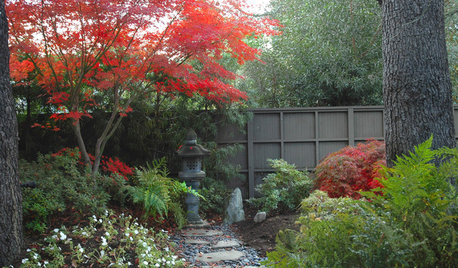Description of a Japanese garden
Herb
19 years ago
Related Stories

ARCHITECTUREDesign Workshop: How the Japanese Porch Makes a Home Feel Larger
The Japanese ‘engawa,’ a roofed transitional zone and social space, blurs the lines between indoors and out
Full Story
GROUND COVERSNative Alternatives to English Ivy, Japanese Pachysandra and Periwinkle
These shade-loving ground covers are good for the environment and say something about where you are
Full Story
GARDENING AND LANDSCAPINGGreat Design Tree: Japanese Maple
Lacy form and fiery fall color make Japanese maple a welcome tree for garden or patio
Full Story
RED FOLIAGEGreat Design Plant: Japanese Blood Grass
This dramatic, ruby-tinged grass bridges the gap between red and green, short and tall plants
Full Story
MODERN ARCHITECTUREHouzz Tour: A Concrete Box Home With Japanese Style
A love of Japan’s minimalistic style and the use of concrete make for a mystical experience in this Houston home
Full Story
INSPIRING GARDENSStroll Through a Magnificent Japanese Garden, Newly Renovated
Get a glimpse of the Huntington's Japanese Garden today along with its storied past in a glossy new book
Full Story
LANDSCAPE DESIGNLay of the Landscape: Create the Beauty of a Japanese Garden
Balance, enclosures and the forms of nature combine in serene Japanese garden design. Bring the look home with some of these principles
Full Story
PATIOSBackyard Ideas: Writer's Studio and a Japanese-Inspired Garden
A nearby Japanese garden inspires a feature-packed backyard and studio for a work-from-home Portland writer
Full Story
GARDENING GUIDESGreat Design Plant: Japanese Painted Fern Weaves a Garden Tapestry
Bring striking colors and texture to your woodland garden with Athyrium niponicum var. pictum
Full Story
GARDENING GUIDES12 Japanese Maples for a Sunny Garden
The right maple in the right place shines in hot summer sun
Full Story





Gardener_KS
Gorfram
Related Professionals
Danbury Landscape Architects & Landscape Designers · Tomball Landscape Architects & Landscape Designers · Beverly Hills Landscape Contractors · Bridgeport Landscape Contractors · Eagle Landscape Contractors · Fuquay-Varina Landscape Contractors · Galt Landscape Contractors · Hayward Landscape Contractors · Manhattan Landscape Contractors · Mission Landscape Contractors · Pahrump Landscape Contractors · Plainview Landscape Contractors · Spring Landscape Contractors · Wickliffe Landscape Contractors · Westford Decks, Patios & Outdoor EnclosuresHerbOriginal Author
bahamababe
DonPylant
The_Mohave__Kid
ron_s